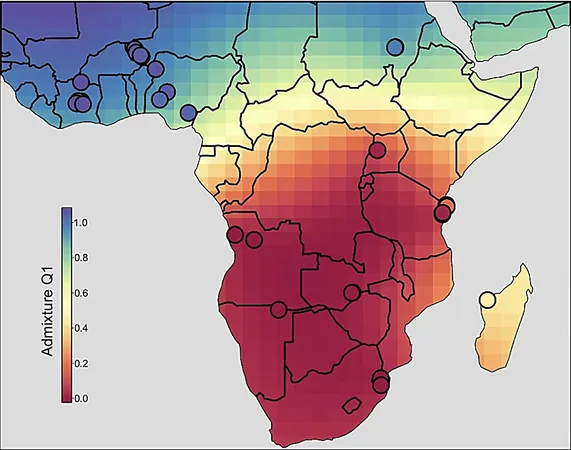
Breakthrough Discovery: Hybrid Worm Threat is a Myth!
2025-05-28
Author: Arjun
Good News for Global Health!
Exciting new research is casting aside fears about schistosomiasis—a disease plaguing over 200 million people worldwide! Contrary to previous beliefs, it has been confirmed that parasitic worms infecting humans do not interbreed with those that infect cattle.
The Myths of Hybridization Exposed!
For years, scientists were concerned that hybridization between the human-infecting Schistosoma haematobium and the cattle-infecting Schistosoma bovis would drastically increase infection risks. A groundbreaking study from Texas Biomedical Research Institute has changed everything!
Professor Tim Anderson, who led the study, declared, "This paper is one of those rare moments in science where it completely shifts the understanding of a field." The findings were published in the prestigious journal, Nature Communications.
Ancient Genetics Unveiled!
The study reveals that while Schistosoma haematobium contains genes from the cattle parasite, this was a result of ancient interbreeding, occurring hundreds of generations ago. Much like how humans retain traces of Neanderthal DNA, these remnants do not indicate ongoing or recent hybridization.
A Tale of Two Regions!
Interestingly, the research highlighted a geographical divide across Africa: human parasite samples from northern Africa showcased cattle genes, but those from southern Africa did not. This suggests two distinct parasite populations, likely due to varying snail hosts crucial in the parasite lifecycle.
Fighting a Neglected Tropical Disease!
Schistosomiasis, commonly found in tropical regions, spreads when people come into contact with infected freshwater. Symptoms can lead to severe health issues, especially in children. Thankfully, the medication praziquantel is effective but up to 30% of treated individuals might still be infected.
A Collaborative Effort!
This incredible study couldn't have been achieved without extensive collaboration global efforts. The team analyzed genomes of 160 parasite samples from 18 countries, sifting through over 34 million genetic variations to unravel these findings.
Collecting samples required significant fieldwork, including trips to Nigeria to gather materials directly from infected individuals and cattle. This challenging yet vital groundwork was supported by contributions from many organizations, proving that teamwork is essential in the fight against global health issues.
Hope for the Future!
Dr. Anderson expressed optimism, stating, "We hope this research will refine how we allocate medical and educational resources to tackle this widespread disease effectively." With these significant insights, the battle against schistosomiasis could see new, more effective strategies emerge!




 Brasil (PT)
Brasil (PT)
 Canada (EN)
Canada (EN)
 Chile (ES)
Chile (ES)
 Česko (CS)
Česko (CS)
 대한민국 (KO)
대한민국 (KO)
 España (ES)
España (ES)
 France (FR)
France (FR)
 Hong Kong (EN)
Hong Kong (EN)
 Italia (IT)
Italia (IT)
 日本 (JA)
日本 (JA)
 Magyarország (HU)
Magyarország (HU)
 Norge (NO)
Norge (NO)
 Polska (PL)
Polska (PL)
 Schweiz (DE)
Schweiz (DE)
 Singapore (EN)
Singapore (EN)
 Sverige (SV)
Sverige (SV)
 Suomi (FI)
Suomi (FI)
 Türkiye (TR)
Türkiye (TR)
 الإمارات العربية المتحدة (AR)
الإمارات العربية المتحدة (AR)